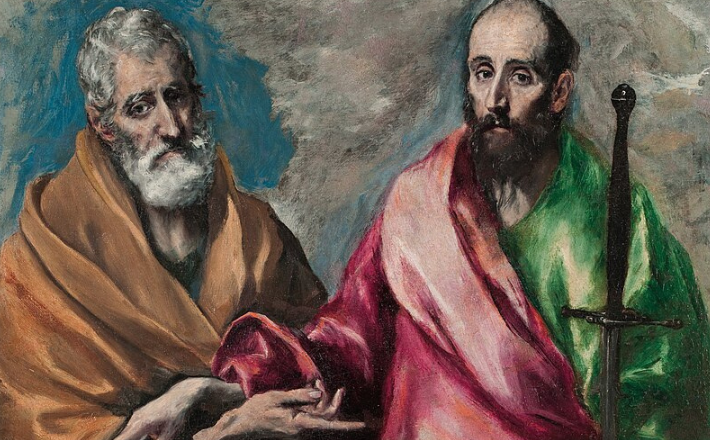Commentary on Galatians 1:13-17; 2:11-21
Although Galatians was written several years after the Jerusalem Conference that was the topic of last week’s reading, the question of whether gentile church members needed to be circumcised and observe the law as Jews observed it continued to be an issue. The issue is complicated because Jews in the church are still Torah-observant, but gentiles are not allowed to keep the law in that way. So, the church struggled with how to come together as a church when some follow Jewish purity laws and some do not. Paul argues that Mosaic food laws and other regulations must not interfere with fellowship with gentile believers. Jewish church members may remain observant and kosher outside the assembly, but they must not allow those observances to limit their conduct and interaction with gentile believers.
In the first part of our reading, 1:13–17, Paul recounts how he became a believer. In what reads more like a prophetic call story (compare Isaiah 49:1–6; Jeremiah 1:5) than a conversion story, Paul says that despite who he was, God’s choice to give him the task of bringing the gospel to gentiles prevailed. Further, his gospel comes straight from God; thus, its validity does not rely on any human source. This source of his gospel makes him the person the Galatians should be listening to, no matter how impressive the other teachers may sound.
Our reading from chapter 2 continues recounting why the readers should listen to Paul. He relates an episode that occurred after the Jerusalem Conference when Peter visited the Antioch church, the church that was the sponsor of Barnabas and Paul’s mission trip that provoked the Jerusalem Conference. It is a church with many gentiles. Paul says that when Peter first arrived, he joined in fellowship with both Jews and gentiles without allowing regulations from Jewish observances to interfere.
But then, when people “from James” showed up, he changed his practice so that those observances prohibited full interaction with gentiles. These people “from James” represent a more limited understanding of the Jerusalem Conference. As they continue to see things, Jewish religious identity must continue to take precedence over their identity as believers in Christ.
The material in 2:14–21 starts as Paul’s response to Peter’s change in behavior and gradually shifts to set out the basic point of Galatians, that justification comes through trusting in Christ’s work, not through keeping the law. Importantly, Paul begins by saying that all Jewish church members know that no one is justified by keeping the law (2:15–16). Interpreters are divided over what Paul sets out as the alternative. Woodenly translated, Paul says justification is “through faith of Jesus Christ.” That could mean faith in Christ or the faith that Christ has, just as “love of the church” may mean love someone has for the church or the love that the church shows. The word “faith” (pistis) has a broad range of meanings, including what you believe to be true, trusting someone, and faithfulness.
With the New Revised Standard Version Updated Edition, I think the best understanding is the faith of Christ. We are justified by the faithfulness of Christ seen in his obedient death. The second half of verse 16 then says that we benefit from his faithfulness by having faith in it or trusting in it. This faith means more than believing something to be true. When Paul speaks of the faith believers have, he means they trust in Christ for their relationship with God, and they live their lives in ways that are consistent with that relationship of trust.
The question of whether Christ is a servant of Sin arises because Paul does violate laws of the Mosaic covenant when he associates with gentiles as he does. He says Christ is not a servant of Sin and that he is a trespasser only if he tries to reapply those rules after not allowing them to interfere with that fellowship. Paul is accusing Peter of doing this, even though he speaks of “I” doing it.
He also wants the Galatians to see that it would apply to them if they now accept circumcision and begin to observe the Torah. Paul uses dramatic language to contrast taking up the law and trusting in the work of Christ. He says he died to the law, through the law. While his meaning is less than clear, dying through the law may point to being crucified with Christ, who died while being an observant Jew. The purpose of dying to the law is so the believer can live for God. In turn, that living of a life oriented toward our relationship with God is enabled by Christ living in the believer. This is another way to talk about the Holy Spirit living in us.
When Paul talks about people having faith, he is speaking of an orientation of life. Faith involves both trusting God to give us right relationship, and a commitment to live in a way that reflects that we are in that relationship with God. Faith involves accepting both a gift and a demand. Just as all other relationships have demands, so having right relationship with God comes with expectations. This relationship with God includes the expectation that all of our lives will be shaped to continually become more conformed to God’s will.
But even this demand is a gift because conforming our lives to God’s will also conforms them to our true nature. God’s will is a reflection of God’s character, God’s justice, mercy, love, and all else that God is. As we conform our lives to God’s character, we more fully live our own nature as beings created in the image of God. As we reflect that nature, we have more meaning and fullness in our lives. So even the demands of the life of faith are a gift. It is made all the better by our reliance on, our trust in the love and grace of God, who is determined to remain in relationship with us now and beyond the grave.
PRAYER OF THE DAY
Lord of justification,
With great joy we receive the gift of salvation which is ours not because of our own efforts, but because of the saving work of Christ. Grant us full access to the glory of your salvation, an abundance that is more than enough for all humankind, for the sake of our redeeming Christ. Amen.
HYMNS
We walk by faith ELW 635, H82 209
Leaning on the everlasting arms ELW 774, UMH 133
CHORAL
That priceless grace, John Helgen


May 25, 2025